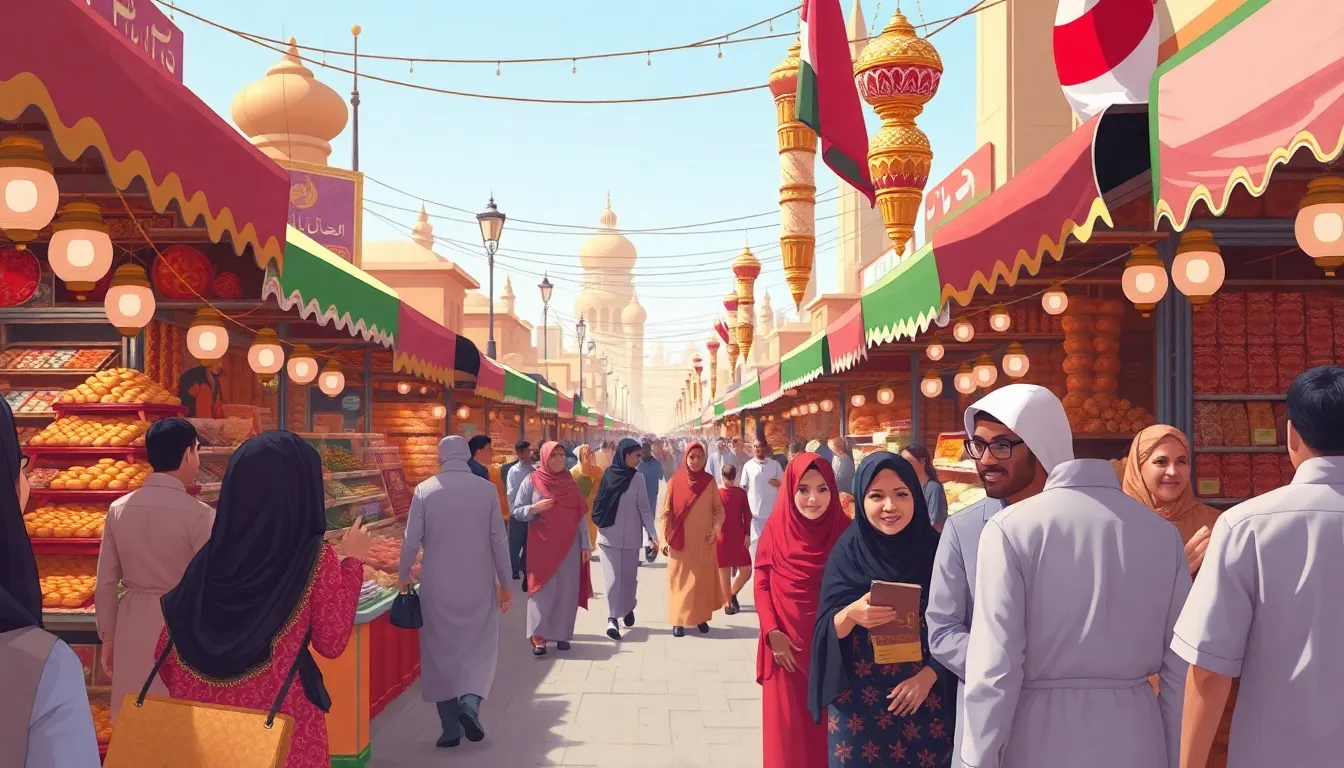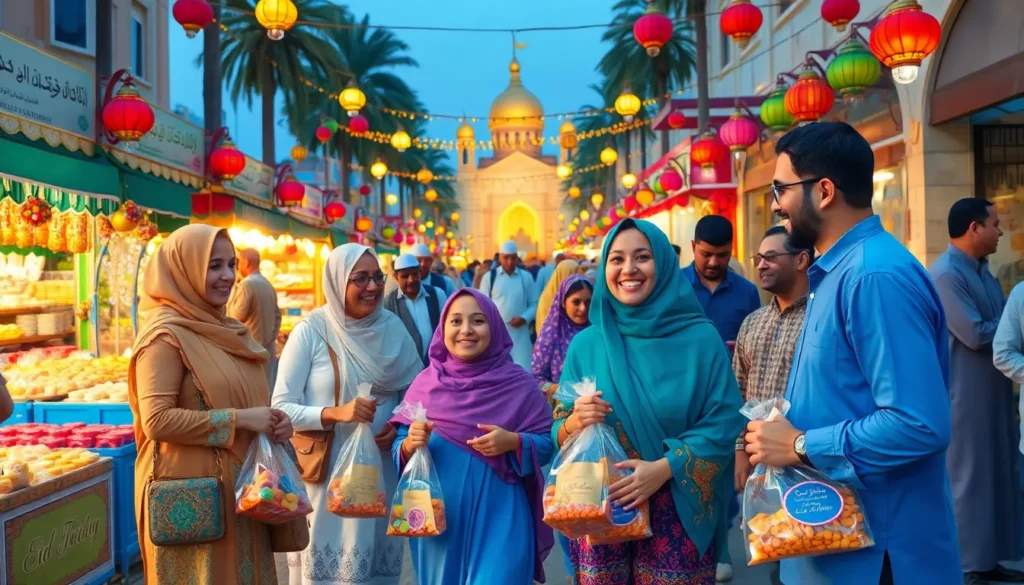Table of Contents
ToggleEid al-Fitr is just around the corner, and for many in Egypt, it’s not just a holiday; it’s a full-blown celebration complete with feasting, family gatherings, and maybe a little too much dessert. As the holy month of Ramadan comes to a close, anticipation builds for this joyous occasion. But when exactly is Eid al-Fitr in 2025?
Overview of Eid Al-Fitr
Eid al-Fitr marks the end of Ramadan, serving as a celebration of joy and thanksgiving in Egypt. Families gather to share meals, exchange gifts, and engage in festive activities. Traditional dishes such as khariq, mahshi, and various types of sweets feature prominently during this time.
Celebrations begin with the Eid prayer held in mosques and open fields, uniting communities in worship. Many take the opportunity to offer Zakat al-Fitr, a form of charity aimed at assisting those in need before the feast.
Children especially look forward to the holiday, excited for new clothes and Eidiya, monetary gifts given to them. Bazaar markets come alive with vibrant decorations and sweets, adding to the festive atmosphere. Friends and relatives send greetings, strengthening bonds through mutual appreciation and respect.
The date of Eid al-Fitr varies each year, determined by the sighting of the moon. In 2025, Eid al-Fitr is expected to be celebrated in Egypt on April 10, although the exact date may shift based on lunar observations. This festive occasion is not only a spiritual milestone but also a cultural event that reinforces community connections.
Gathered around homes and public spaces, people reflect on the importance of sharing and gratitude. It’s a time when the spirit of togetherness prevails, with everyone from children to elders participating in the celebrations.
Significance of Eid Al-Fitr

Eid al-Fitr holds deep significance for Muslims, especially in Egypt. This holiday marks gratitude to Allah for the strength endured during Ramadan’s fasting and worship.
Religious Importance
The religious importance of Eid al-Fitr is profound. It represents the end of a month dedicated to spiritual reflection and devotion. Communities gather for the Eid prayer, which enhances unity among worshipers. Many individuals also give Zakat al-Fitr before prayer, ensuring that the less fortunate share in the celebrations. This act of charity emphasizes the Islamic principle of caring for those in need. Auspiciously, Eid al-Fitr instills a sense of renewal and spiritual awakening after Ramadan, reinforcing believers’ commitment to their faith.
Cultural Celebrations
Cultural celebrations during Eid al-Fitr showcase Egypt’s rich traditions. Families prepare festive meals, with popular dishes like khariq and mahshi. Children receive Eidiya, a monetary gift that adds excitement to the occasion. Vibrant bazaars fill with shoppers looking to buy new clothes and sweets. Traditional sweets like maamoul and basbousa become favorites among attendees. Beyond feasting, community gatherings enhance social ties, as friends and families celebrate together. These unique cultural aspects highlight the joyous spirit of Eid al-Fitr while strengthening community bonds.
Determining the Date in Egypt
Eid al-Fitr’s date hinges on several factors, primarily based on the lunar calendar and traditional moon sightings.
Lunar Calendar and Moon Sighting
The Islamic lunar calendar determines the start of each month, including Ramadan. In 2025, Ramadan will end with the sighting of the crescent moon, signaling Eid al-Fitr’s arrival. Accurate moon sightings can vary, especially with cloud cover or geographical factors. Communities often gather to witness these sightings, reinforcing cultural traditions. Muslims in Egypt look toward local religious authorities for confirmation, as their announcements hold significant weight in determining the date. Thus, the official moon sighting leads to a shared celebration.
Official Announcements
Official announcements regarding Eid al-Fitr typically come from the Egyptian Ministry of Awqaf. They monitor moon sightings closely and provide guidance to the public. After the moon is sighted, announcements are usually made on local news outlets and social media to ensure everyone is informed. Community leaders also often disseminate this information, enabling families to plan their festivities. In 2025, expect announcements regarding Eid al-Fitr around April 9, clarifying the celebrations set for the following day. This collaboration guarantees a unified observance throughout the country.
Eid Al-Fitr 2025 Date in Egypt
Eid al-Fitr in 2025 is anticipated to take place on April 10. The celebration marks the conclusion of Ramadan, highlighting gratitude and joy. Families gather to share meals and engage in various festive traditions. Traditional dishes such as khariq, mahshi, and desserts take center stage during these gatherings.
The date relies on the lunar calendar and is confirmed through moon sightings. Local religious authorities, including the Egyptian Ministry of Awqaf, monitor these sightings and make the official announcements. Expect announcements around April 9, ensuring communities celebrate together.
Unity among worshippers is a core aspect of Eid al-Fitr’s significance. Many participate in communal prayers, reinforcing their faith and commitment. Engaging in Zakat al-Fitr demonstrates care for the less fortunate, reflecting the holiday’s spirit. Children eagerly await Eidiya, which typically consists of monetary gifts, enhancing their excitement for the festivities.
Vibrant bazaars emerge as families shop for essentials, new clothes, and sweets. The atmosphere full of energy contributes to the celebratory mood. Overall, Eid al-Fitr serves not only as a religious milestone but also as an opportunity for strengthening bonds within families and communities.
Celebrating Eid Al-Fitr in Egypt
Eid Al-Fitr in Egypt stands out for its vibrant traditions and communal spirit. Families embrace various customs that enhance the holiday experience.
Traditional Customs and Practices
Turkish delight, maamoul, and basbousa often serve as festive treats during this time. Preparations for Eid begin days in advance, with families cleaning homes and purchasing new clothes for celebrations. The Eid prayer holds great significance, drawing large crowds to mosques and open spaces. Many individuals donate Zakat al-Fitr, highlighting the importance of charity and compassion. Children eagerly await Eidiya, small monetary gifts from relatives, which adds to the excitement. Traditional dishes, like khariq and mahshi, bring families together around the table.
Community Festivities
Bazaars come alive with lights, decorations, and colorful stalls selling clothes and sweets. Local communities organize events that foster connection among residents. Parades and music create a celebratory atmosphere throughout the streets. Neighbors often visit each other, sharing food and good wishes. Families partake in recreational activities, including fairs and games, which appeal to all ages. Cultural performances showcase Egypt’s rich heritage, engaging audiences with music and dance. These communal festivities enrich the holiday experience, emphasizing unity and joy.
Eid al-Fitr in Egypt is a time of joy and togetherness that brings families and communities closer. As April 10, 2025 approaches, excitement will build for the celebrations that follow the holy month of Ramadan. The blend of religious observance and cultural traditions creates a unique atmosphere filled with gratitude and festivity.
The communal spirit shines through as families gather for prayers, share meals, and engage in charitable acts. With vibrant bazaars and the anticipation of new clothes and treats, Eid al-Fitr embodies a celebration of faith and unity. This cherished holiday not only marks the end of Ramadan but also strengthens bonds among loved ones and the community at large.







